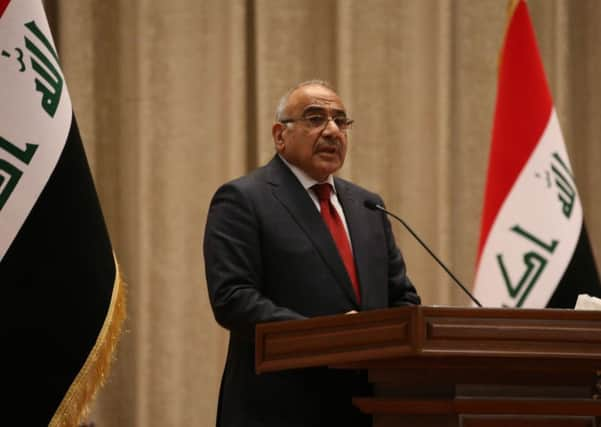Struan Stevenson: New Iraqi leader no cause for optimism


The cause of Iraq’s disintegration cannot be blamed solely on the Bush/Blair invasion and the overthrow of Saddam Hussein’s cruel Baathist regime. The eight-year term in office of prime minister Nouri al-Maliki, a puppet of the Iranian regime, sowed the sectarian seeds, which set off a low-level civil war and paved the way for Isis to invade the country from Syria. But, despite repeated warnings, the West stood aside and allowed Maliki to remain in office for two disastrous terms. Maliki did Iran’s bidding, opening a direct route for Iranian troops and equipment heading to Syria to bolster the bloody Bashar al-Assad regime.
So, the world breathed a sigh of relief when he was replaced as prime minister by Haider al-Abadi. But, instead of outlawing the savage Shi’ia militias associated with the Iranian regime, Abadi allowed them to wage a genocidal campaign against the Sunni population of Iraq. Under the pretext of fighting Isis, the ancient cities of Fallujah, Mosul and Ramadi were reduced to rubble, their men murdered and their women and children dispersed.
Advertisement
Hide AdAdvertisement
Hide AdIn a last-ditch attempt to hold on to office in the 12 May elections this year by sucking up to the Americans, Abadi threw his weight behind the re-imposed US sanctions on Iran. But the move backfired spectacularly, and despite Herculean efforts by Washington’s special envoy, Brett McGurk, who spent weeks trying to persuade Iraqi politicians to support Abadi and isolate Iran, it all came to nothing. Abadi even lost the support of his own political party and was cast aside in favour of the new prime minister, Adel Abdul Mahdi.
Mahdi is relatively unknown, even inside Iraq. He served as an uninspiring oil minister from 2014-2016, allowing his ministry to become the private fiefdom of his own political party cronies from the Islamic Supreme Council of Iraq. He is pro-Iranian and equivocal about supporting America.
Although, like Abadi, he pledged to introduce a cabinet of technocrats, the reality has inevitably been somewhat different. The coalition of parties he required to support his elevation to the role of prime minister each demanded their pound of flesh, jockeying fiercely for the key cabinet posts. The end result is yet another government almost entirely composed of pro-Iranian minions, lightweights who answer only to their political parties rather than to the state.
Mahdi’s inability to honour his pre-election pledge has already revealed his weakness as a leader, a vulnerability that the mullahs in Tehran will be quick to exploit. Indeed, alarmingly, his nominee for the powerful interior ministry is Falih al-Fayadh, who ran the Iran-backed Popular Mobilisation Forces militias.
Mahdi was proposed as prime minister by the newly elected Iraqi President Barham Salih, who emerged from a chaotic campaign that saw the Kurds, who traditionally bury their political differences to unite behind a single presidential candidate, ferociously divided. The pro-Iranian Salih’s election by a decisive majority in the national parliament in Baghdad was seen as a blow to the Kurdistan Democratic Party (KDP) leader Masoud Barzani and by extension also to the Americans. So, across the board, America has lost and Iran has won, a scenario that bodes ill for the future.
McGurk, who for many years has been the US Special Presidential Envoy for the Global Coalition to Defeat Isis, seems to be more keen on trying to create a compromise between the interests of Iran and the United States in Iraq. Such a compromise is a hollow illusion. The Iranian regime only retreats when it is faced with firmness from the US.
If Iraq really needs America’s political, military and economic assistance, it must immediately stop the interference of the Iranian regime. Iraq is the Iranian regime’s number one priority for domination and the US should therefore regard the eviction of Iran from Iraq as a matter of urgency.
Struan Stevenson was a member of the European Parliament representing Scotland (1999-2014), president of the Parliament’s Delegation for Relations with Iraq (2009-14) and chairman of Friends of a Free Iran Intergroup (2004-14). He is an international lecturer on the Middle East and president of the European Iraqi Freedom Association (EIFA)